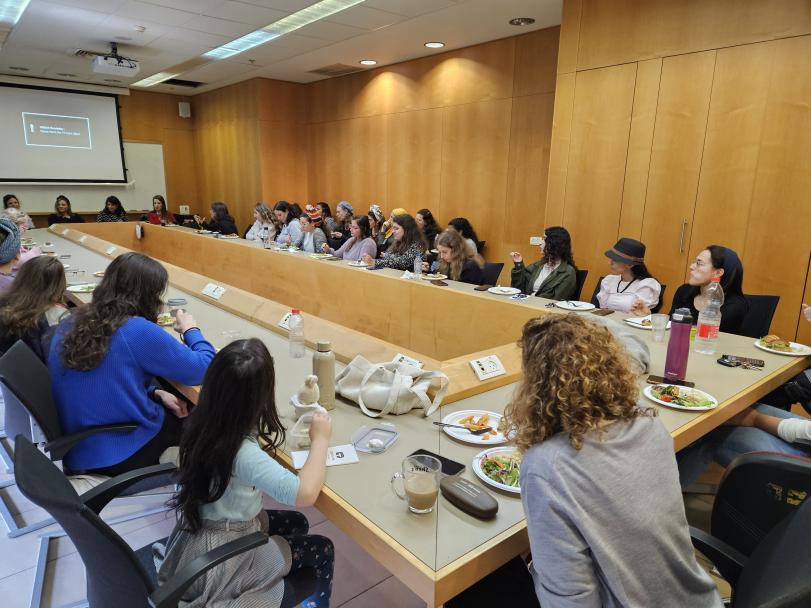Engineering, Women, and Career: International Women’s Day at the Faculty of Engineering

In honor of International Women’s Day, the Faculty of Engineering hosted a panel with female alumni in key positions in the industry. They spoke about breaking the glass ceiling, balancing children and a career, and the advice they would have given their younger selves.
On March 14th, the Faculty of Engineering hosted a special panel in honor of International Women’s Day. Dr. Neta Zilony Hanin, Dr. Michal Yemini, Dr. Tali Ilovich and Dr. Oshra Betzer participated in the event, organized by Dr. Mor Weiss, the panel was orchestrated by Dr. Yael Bar-Tzedek of the Gender Studies program. Some 40 female graduate and postgraduate students attended, along with faculty members, and enjoyed a fascinating discussion about engineering, women, and career.
The panelists were first asked to describe the early days of their professional career. Dr. Oshra Betzer, for example, recounted how she started out working at a place that did not fully encourage women who wanted a family alongside their career. Inspired by a co-worker who chose to pursue a PhD, Dr. Betzer did the same, and joined the biomedical engineering, a field which combines numerous fields of knowledge and offers career opportunities at the forefront of science. Dr. Tali Ilovich was a PhD student who, during a routine prenatal sonogram, realized that there were many aspects in the world of optics that can also be applied to sonograms and thus improve current technology, save lives, and make an impact. “I decided to do my postdoctoral research on sonograms, and sent out emails that pretty much went: “Hi, I’ve never worked with sonograms but I have some pretty cool ideas,” she shared. She managed to procure an internship, published her first article on the subject in only three months, and became the Faculty of Engineering’s very first female post-doctoral student.
Next, Dr. Bar-Tzedek asked the panelists what they wished they had known when they were students. Dr. Michal Yemini responded that she learned about the importance of being proactive. “It’s good to sing your own praises every now and then,” she said. “In the short term we might get a nasty look, but in the long term women gain from taking initiative and risks. Think about how you should be, then add 20%-30% to make up for doubts and fears.” Dr. Neta Zilony Hanin said that oftentimes, female students don’t pursue advanced degrees because they’re afraid to be overqualified, due to the misconception that there are few career opportunities for women with a PhD. “As students, we don’t interact with senior women in the industry, so we have no way of knowing that the opposite is true: there’s great demand for leading women who can pave the way and spearhead projects,” she said, and told the audience that if anyone has these doubts, she should shed them. She added that “It’s OK to hear ‘no’ sometimes; it teaches you what to do differently in the future.”
Answering the same question, Dr. Oshra Betzer said she learned not to be afraid to make mistakes. “I don’t look back at things I’ve done and learned in the past as mistakes; everything I’ve been true contributed and drove me forward. Maybe if I had done things differently I would have reached my current position faster, but I wouldn’t have the knowledge I’ve accumulated along the way,” she explained. Dr. Tali Ilovich spoke about the importance of believing in yourself. “In research, there are plenty of unknowns and things that could go wrong, and we have a tendency to blame ourselves when things don’t work out. When I started my second year of my PhD, I was afraid I might not be cut out to be a researcher because I don’t have new ideas, and I was only doing hat my advisor was telling me to do. He said I shouldn’t worry, it’ll change. And the next year I really had ideas of my own. Believe in yourself and understand that sometimes things don’t go according to plan, and that’s OK. Don’t give up.”
The panelists then took questions from the audience. One participant asked how they handle the work-family conflict and the constant feeling of “I’m not a good enough mom or a good enough researcher.” Dr. Neta Zilony Hanin replied that every woman finds her own balance, but there are some concessions you have to make. “I made a decision about what events in my kids’ lives I need to be a part of, and what are things others can do,” she said. Dr. Michal Yemini said that these kinds of conflicts, and the feeling we’re not good enough often comes from comparing ourselves to others. “We need to compare ourselves to ourselves and prioritize,” she recommended. Dr. Oshra Betzer said it’s easier to cope with the conflict when you love your job and go in with a sense of mission. Dr. Tali Ilovich took a more practical approach and said that she spearheaded a change at the university so that advanced degree courses will be held in the morning hours instead of afternoons.
Another participant asked what’s the benefit of pursuing a PhD. Dr. Neta Zilony Hanin answered that her main motivation was wanting to hold a key position in the industry, because without a PhD, you’re bound to encounter a glass ceiling. In response to another question about whether to continue working in the industry while studying, she sai: “I don’t believe in missing out. If you’ve missed one opportunity, another door will open.” Dr. Tali Ilovich said that people with PhDs make up R&D in leading companies, and urged the participants: “You have every opportunity at your feet. If you want it, all the options are out there.”
Last Updated Date : 31/03/2024



